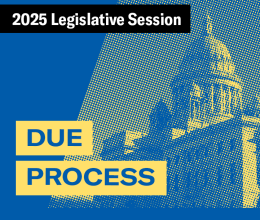In an important victory against overzealous and unconstitutional immigration enforcement practices, a federal appeals court today rejected efforts by immigration officials to be dismissed from an ACLU lawsuit on behalf of a North Providence resident who was locked up at the ACI in 2009 as a deportable “alien” even though she is a U.S. citizen. Today’s ruling by the U.S. Court of Appeals for the First Circuit affirms a decision issued last year that there are critical constitutional limits on the power of immigration and corrections officials to detain people while investigating their immigration status.
Ada Morales, who was born in Guatemala and became a naturalized United States citizen in 1995, was taken into custody on criminal charges in May 2009. While she was being held at the ACI, Immigration and Customs Enforcement (ICE) officials lodged an “immigration detainer” against her – apparently assuming, based on her race and her place of birth, that she was a deportable non-citizen. A judge had ordered Ms. Morales released, but the R.I. Department of Corrections held her in custody for an additional 24 hours solely because of the ICE detainer, and even after she repeatedly told officials she was a U.S. citizen and offered to show them her naturalization certificate and passport. In 2012, the ACLU sued on her behalf, arguing that the detention violated her constitutional rights to equal protection of the law and freedom from unreasonable searches and seizures.
In an opinion issued last year, U.S. District Judge John J. McConnell, Jr. agreed that Morales had raised viable claims, holding, among other things, that she had “set forth plausible allegations that she was unconstitutionally detained solely based on her national origin and Hispanic last name.” The court also concluded that the Fourth Amendment doesn’t permit ICE or state officials to hold someone in jail merely to investigate their immigration status; an arrest must be based on probable cause, not mere investigative interest.
Three of the ICE officials who were sued for being responsible for Morales’s detention appealed that ruling, arguing that they should be dismissed from the suit because at the time of her detention in 2009, the law was not clearly established that probable cause was required in order to issue a detainer against an alleged undocumented immigrant. The appellate court unanimously disagreed today, calling that argument an “unprecedented proposition … contradicted by longstanding Fourth Amendment jurisprudence.” Rather, the court held, “the law was clearly established” in 2009 that probable cause was required to detain Morales pursuant to an immigration detainer.
The defendants also challenged the lower court’s holding that Morales had plausibly alleged that she was detained because of her national origin. The appellate court dismissed that portion of the appeal, concluding it was without jurisdiction to consider it.
ACLU of Rhode Island executive director Steven Brown remarked: “The unseemly eagerness of some immigration officials to deport people led to an innocent person’s wrongful imprisonment. I am hopeful that this unambiguous ruling will encourage real reform of ICE’s immigration detainer practices.”
National ACLU attorney Kate Desormeau added: “The Court has affirmed that immigration officials, just like other law enforcement officials, must comply with the Fourth Amendment. The Constitution does not permit ICE to lock people up simply to buy more time to investigate them.”
Besides Desormeau, the suit is being handled by Omar Jadwat, senior staff attorney with the National ACLU Immigrants’ Rights Project, and Lena Graber, volunteer attorney for the National Immigration Project of the National Lawyers’ Guild. At the district court, Morales is also represented by Mark Ford, Margaret O’Grady, Angela Yoon, and Laura Donovan of Wilmer Cutler Pickering Hale and Dorr LLP.




